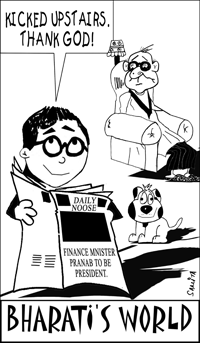Maharashtra: Generational envy
A youth revolt is brewing in Mumbai (pop. 20.5 million) — India’s commercial capital and most cosmopolitan and westernised city. A series of police raids and crackdowns on pubs, restaurants, discotheques and party revellers over the past two months, is generating a surge of anger against the police and state government, particularly among influential and articulate middle and upper class youth who have traditionally enjoyed more social and night-life freedoms than their counterparts in other parts of the country.
On June 24, a citizens’ rally was staged in the upscale suburb of Bandra, to protest the ‘moral policing’ and raids mounted by the social service branch of the Mumbai police and assistant commissioner Vasant Dhoble in particular, who has been hogging media headlines for raiding bars, restaurants and clubs. By way of justification, he cites rules of the Bombay Police Act, 1951, Bombay Shops and Establishments Act, 1948, Prevention of Cigarette and Other Tobacco Products Act, Prevention of Immoral Trafficking Act and Bombay Prohibition Act, 1949, practised more in the breach than observance.
 The surge of anger against moral policing in this metropolis famous for its nightlife, Bollywood and relatively liberal lifestyle, is not confined to youth. The city’s intelligentsia is also outraged by media visuals of assistant commissioner Dhoble — a neo-literate rustic — who wields a hockey stick and liberally labels chic middle class women as prostitutes.
The surge of anger against moral policing in this metropolis famous for its nightlife, Bollywood and relatively liberal lifestyle, is not confined to youth. The city’s intelligentsia is also outraged by media visuals of assistant commissioner Dhoble — a neo-literate rustic — who wields a hockey stick and liberally labels chic middle class women as prostitutes.
According to Yogesh Pratap Singh, hitherto a member of the Indian Police Service (IPS), who resigned from the force in 2004 in protest against rampant favouritism and corruption within the IPS, and is currently a practising lawyer and civil rights activist, the crackdown on the exuberant youth culture and globalised lifestyle of the maximum city’s youth can be attributed to a generational divide, especially between recent rural migrants into Mumbai and progeny of the nouveau riche who have benefited mightily from economic liberalisation. “The older generation has to come to terms with the country’s demographic profile with youth now being the majority. Far from endorsing the bull-in-China shop raids of Dhoble and his men, it’s time to empower youth by educating them about their constitutional rights so they can stand up to oppression by citing the law. Therefore the quality of education in schools and colleges needs to be upgraded so children and youth know their rights and freedoms,” says Singh, also the author of a novel Carnage of Angels (2003) which exposes the corrupt politician-police-underworld nexus in urban India.
Undoubtedly, the type of vigilantism practiced by Dhoble stems from his failure to understand the cosmopolitan space where due process of law is followed and citizens’ freedoms are valued. Moreover, Dhoble’s track record in the police force is far from inspiring. In 1989 he was suspended by the Maharashtra Anti Corruption Bureau in Pune for accepting a bribe. Subsequently in 1994 he was sentenced to seven years in prison for his role in a custodial death. He was dismissed from the force but was reinstated in 1996 after his jail sentence was revoked by the Bombay high court.
According to Shilpa Phadke, sociologist and assistant professor at the Centre for Media and Cultural Studies at the Tata Institute of Social Sciences, suspicion of social interaction between the sexes and disapproval of westernised lifestyles is widespread in contemporary Indian society. “There’s a collective inability to understand the changing world. Resentment of the new freedoms and energy of young people prompts patriarchal authority figures to dominate and control youth,” explains Phadke.
Yet there’s an emerging consensus within Mumbai’s vibrant intelligentsia that Dhoble’s raid raj which has the approval of the state’s self-righteous small-town home minister R.R. Patil, who famously shut down Mumbai’s popular dance bars throwing thousands of dancing girls and waitresses out of employment seven years ago, is rooted in generational envy. “Where do these antediluvian attitudes come from? To start with, there is the usual generational thing, but it’s exacerbated by a society largely unwilling to embrace modernity and liberal attitudes that accompany it. There is also a large element of class resentment. ‘How can these people enjoy life like we never did?’ ‘How can boys and girls mix so freely when we couldn’t?’ And ‘how can these people spend so much money on having fun, when we can’t do so even now?” writes columnist Anil Dharker in the Times of India (June 17) as an explanation of the Dhoble mindset.
Bull’s eye!
Praveer Sinha (Mumbai)














Add comment